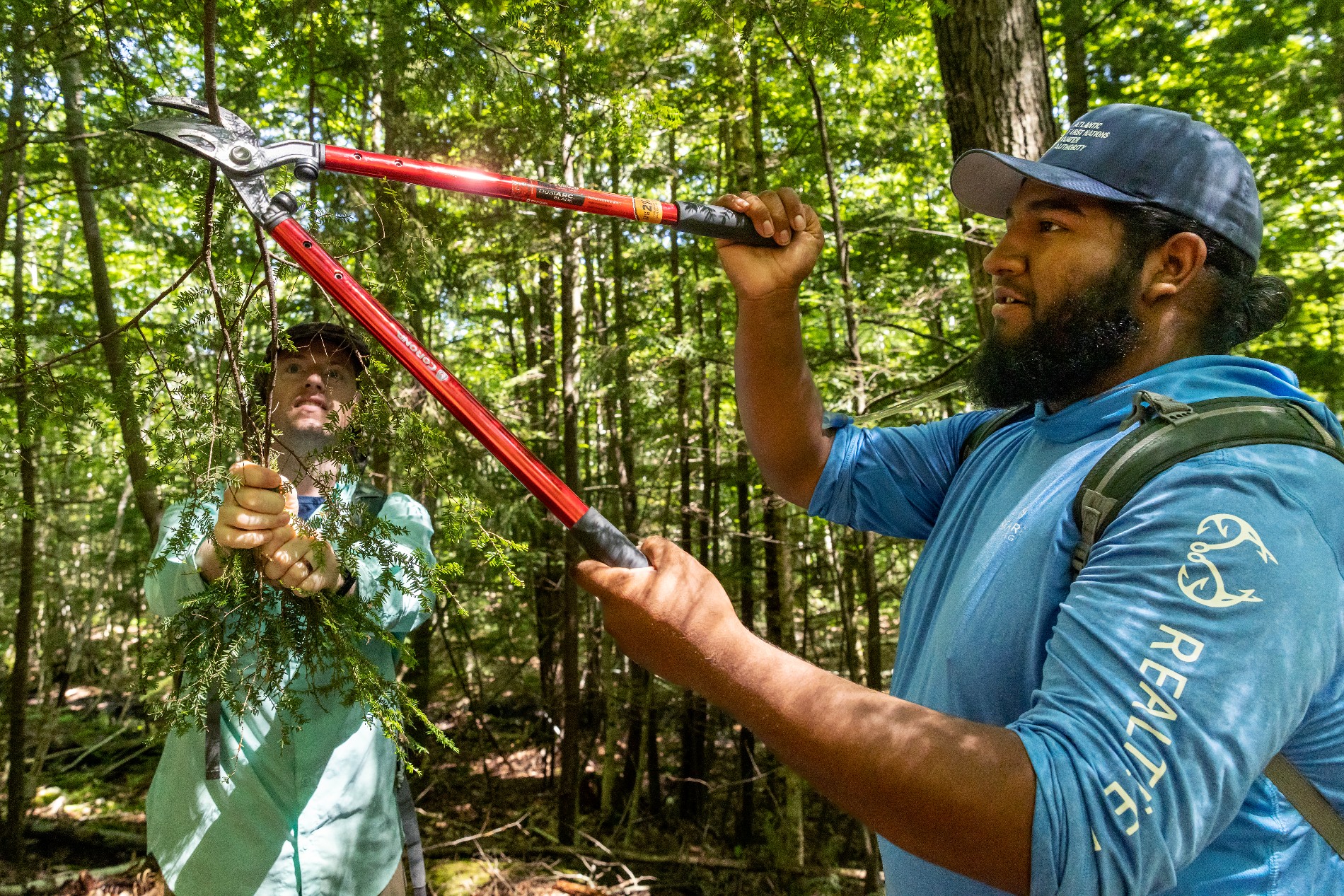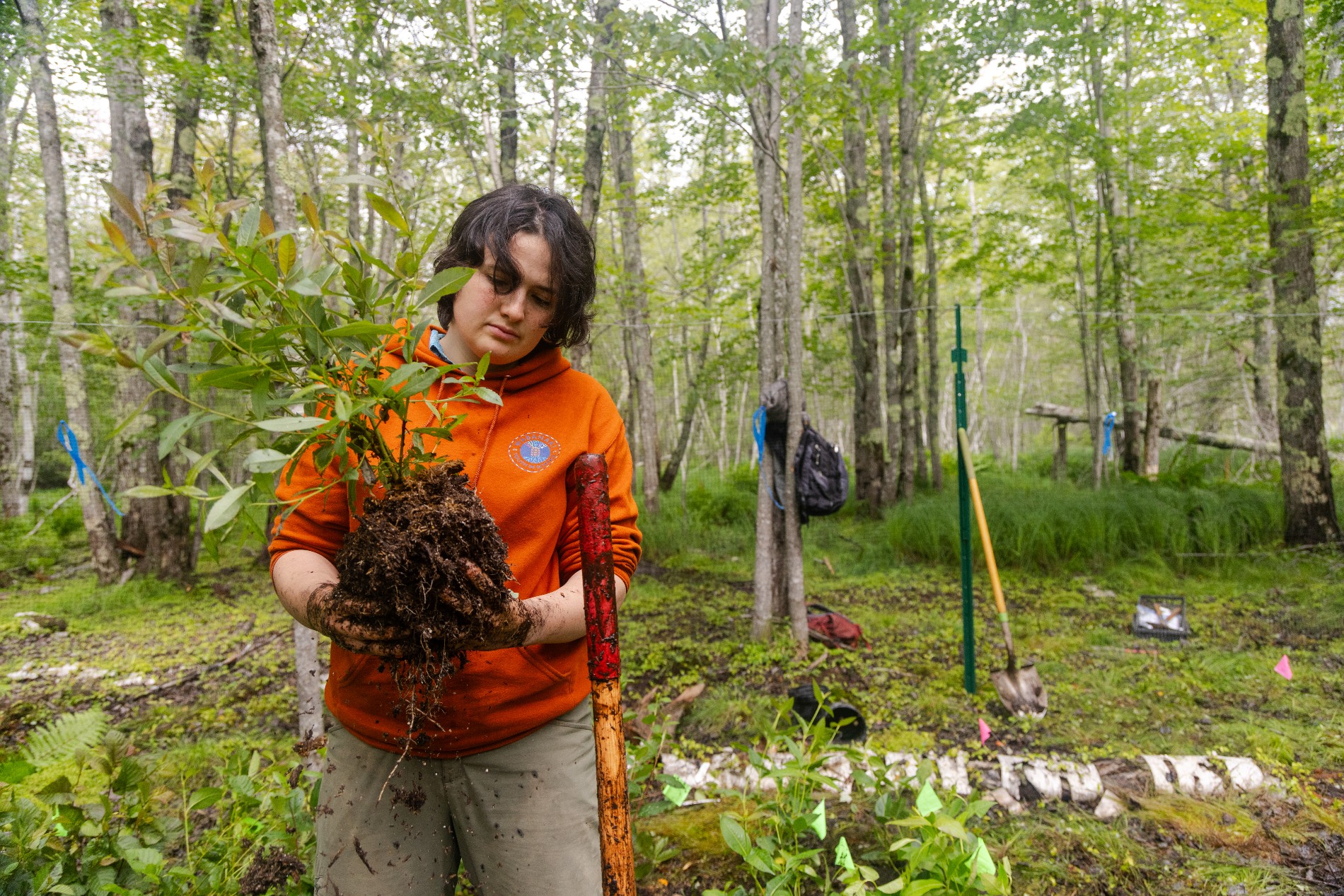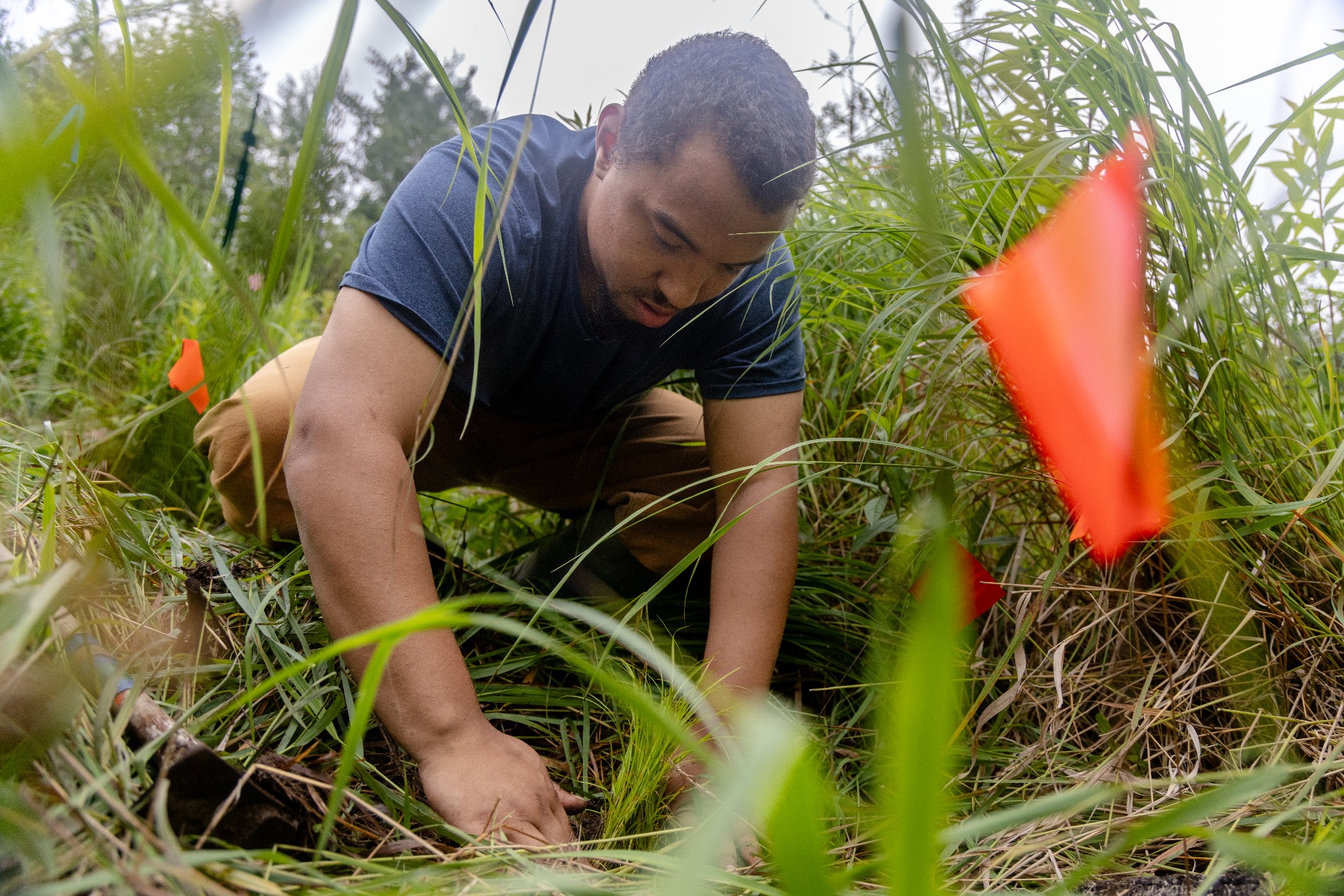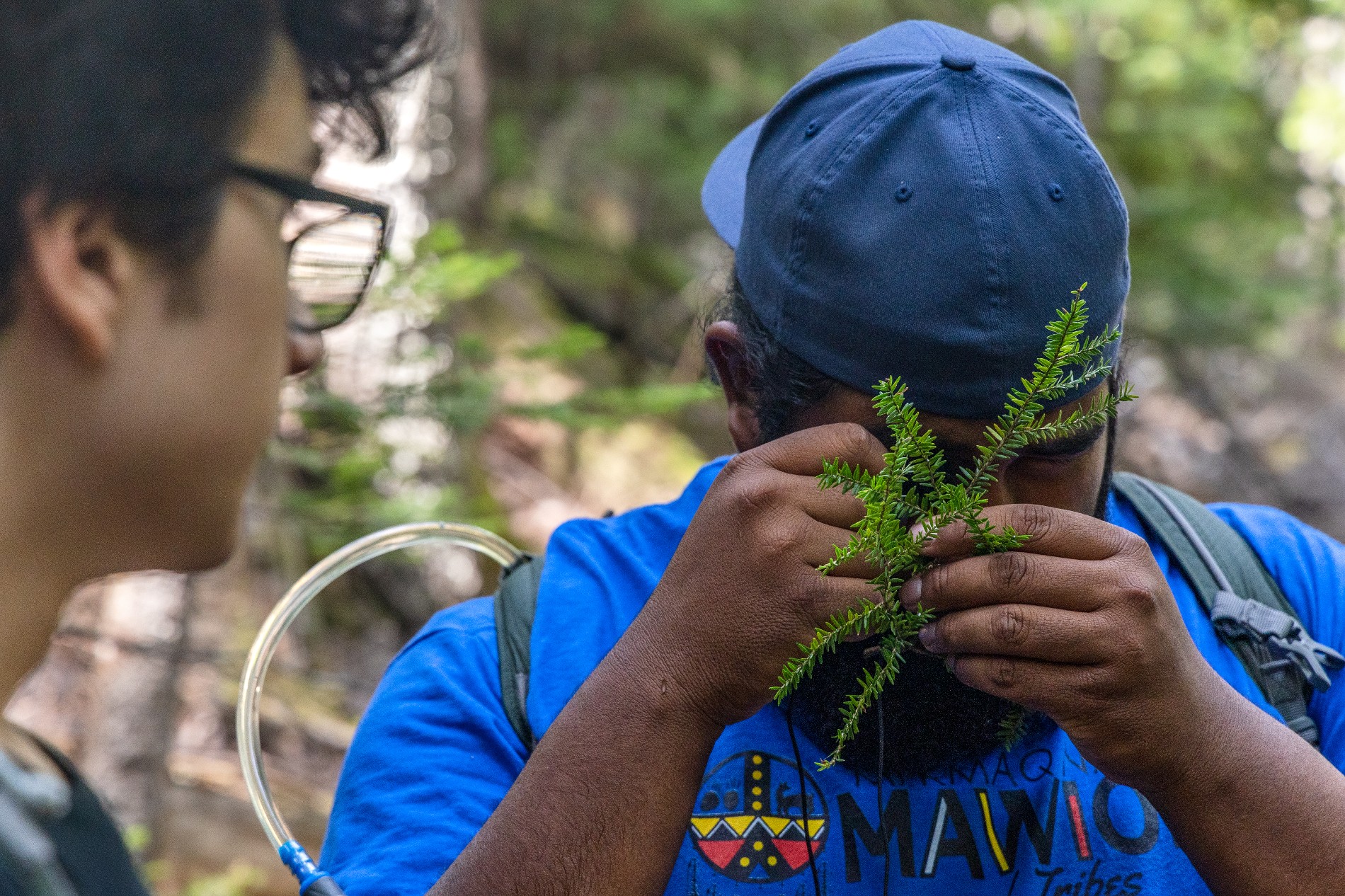Honoring Cultural Knowledge and Scientific Inquiry
Wabanaki Youth in Science (WaYS) Program Empowers Youth Within the Wabanaki Confederacy
July 27th, 2024
Wabanaki Youth in Science (WaYS) Program Empowers Youth Within the Wabanaki Confederacy
July 27th, 2024
BY JULIA WALKER THOMAS
Etuaptmumk is the Mi’kmaq word for the “gift of multiple perspectives.”
Also called “Two-Eyed Seeing,” it refers to learning to see from one eye with the strengths of Indigenous knowledge and ways of knowing and from the other eye with the strengths of Western science—and learning to use both these eyes together for the benefit of all.
Here in Maine, the Wabanaki Youth in Science (WaYS) program immerses Indigenous youth in the wonders of scientific inquiry while simultaneously honoring their community and culture through the teachings of Cultural Knowledge Sharers (CKS) to encourage “Two-Eyed Learning.”
It’s an innovative initiative that stands as a beacon of empowerment and opportunity for Indigenous youth within the Wabanaki Confederacy, comprised of the Penobscot, Passamaquoddy, Maliseet, and Mi’kmaq Nations, and the Abenaki Nation in Canada. Through engaging workshops, field trips, and collaborative projects, the program fosters cultural knowledge and nurtures scientific curiosity, community engagement, and academic success among its participants.

Benjamin Collette, Wabanaki Youth in Science trail crew leader, holds a hemlock branch for Wambli Martinez, Wabanaki Youth in Science trail crew member, to trim back off the Hemlock Road. (Photo by Ashley L. Conti/Friends of Acadia)
An Indigenous-led organization, the WaYS program addresses a critical need for Indigenous representation in science, technology, engineering, the arts, and mathematics (STEAM). Providing access to hands-on learning experiences, mentorship, and resources equips Wabanaki youth with the skills and confidence needed to pursue careers in STEAM fields traditionally underrepresented by Indigenous peoples.
Indigenous knowledge has often been marginalized, dismissed, or outright suppressed throughout history, particularly by colonial powers and dominant Western societies.
Several factors have contributed to this disregard, including colonialism and imperialism, Eurocentrism and forced assimilation policies, exploitation, appropriation, and a lack of representation.

Elena Sparrow of the Wabanaki Youth in Science (WAYS) program, collaborates with the Acadia National Park vegetation crew and the Schoodic Institute by planting native plant species in Great Meadow. (Photo by Sam Mallon/Friends of Acadia)
Despite these challenges, Indigenous scholars, activists, and communities have worked tirelessly to reclaim, preserve, and revitalize their traditional knowledge systems.
One of the programs under the WaYS umbrella is the Ancestral Lands Trail Crew (AL Trail Crew.) The program, started in 2020 as one team, has now expanded to two teams of five Wabanaki youth ages 16-25 who travel to national parks, land trusts, tribal communities, and Indigenous nonprofit organizations throughout Wabanaki Territory to gain experience combining cultural knowledge and Western science on ancestral lands.
In just four seasons, the program has seen a lot of growth. WaYS Executive Director and Program Manager tish carr says the popularity and enthusiasm for the program is very encouraging. Recently, two members of the AL Trail Crew were promoted to full-time positions with WaYS. Wambli Martinez, a long-time WaYS intern, and Jayden Dana are now co-leaders for the trail crew.
“The AL Trail Crew has an almost 100 percent return rate—hiring on Jayden and Wambli full-time was huge. It helps us build community and connection,” carr said. “They keep in contact with the other crew members. If we can find internships for them, we do that. We also extend the season for as long as possible to help them stay engaged and connected.”

Zack Lola of the Wabanaki Youth in Science (WaYS) program, collaborates with Acadia National Park’s vegetation crew and Schoodic Institute by planting native plant species in one of the areas of Great Meadow where native plant restoration is taking place. (Photo by Sam Mallon/Friends of Acadia)
In 2023, during their nine weeks in Acadia National Park, the AL Trail Crew worked with park staff to build bog bridges, repair stonework, learn about and mitigate invasive species, and participate in the Soil to Summits restoration program.
In addition to working with park staff, the AL Trail Crew is regularly joined by recently hired Kyle Lolar, WaYS Cultural Liaison. Lolar, who is Passamaquoddy and Penobscot, shares tribal history and timelines to help foster a deeper understanding and appreciation for the ancestral land that is Acadia National Park.
“WaYS is important to help our younger generations reacquire knowledge that was once freely given by thousands of years of knowledge, acquisition, and practice. It has since been removed by the extractive practices of the culture around us. WaYS allows us to bridge the traditional ecological knowledge with academia, allowing us to educate that science is a living, breathing entity.
We have naturally learned from creation around us and are not constrained by the absolutes paradigm known to exist within academia,” Lolar said. Representatives from the WaYS program were invited to present at The Corps Network 2024 National Conference in Washington, D.C. in March, 2024.
“It was the first time we were at a national level speaking about our program,” carr said. “The program is unique nationally because there are other ancestral lands trails crews, but they don’t have the cultural component and connections during the trail season as well as after the trail season ends.”
As part of their time in Washington, they also toured United States Secretary of the Interior Deb Haaland’s office.
By bolstering a sense of belonging and pride in Indigenous identity, the program promotes resilience and self-determination among Wabanaki youth by serving as a catalyst for empowerment, innovation, and cultural resurgence.

Wambli Martinez (right), of Houlton, ME, working with the vegetation crew via the AL Trail Crew of Wabanaki Youth in Science (WaYS), uses a hand scope to identify hemlock woolly adelgid, an invasive pest threatening hemlock trees. (Photo by Sam Mallon/Friends of Acadia)
Nurturing their potential as scientists and stewards of their ancestral lands ensures that the voices, experiences, and knowledge of Wabanaki people shape the landscape of STEAM and beyond.
Participants emerge from the program with the ability to use and share the invaluable “two-eyed seeing” of Indigenous knowledge and Western science to address complex environmental and social challenges now and into the future.
“One of the things that we’ve heard from a number of Native youth involved in our program is that they felt like they were ahead of their classmates when they first entered college because of WaYS and understanding how the two types of knowledge come together. Feeling like they are ahead of their classmates is huge—that empowerment and that confidence is massive. That’s what we are trying to accomplish here,” carr said.
Learn more about the WaYS program at wabanakiyouthinscience.org.
JULIA WALKER THOMAS is Friends of Acadia’s Visual Storytelling & Visual Assets Manager.